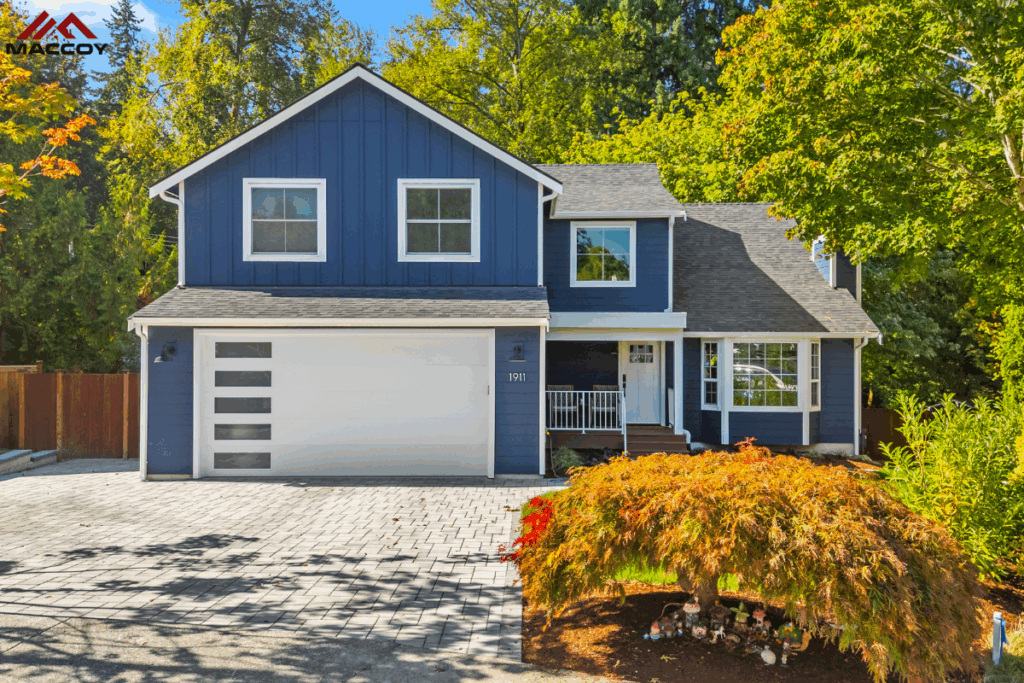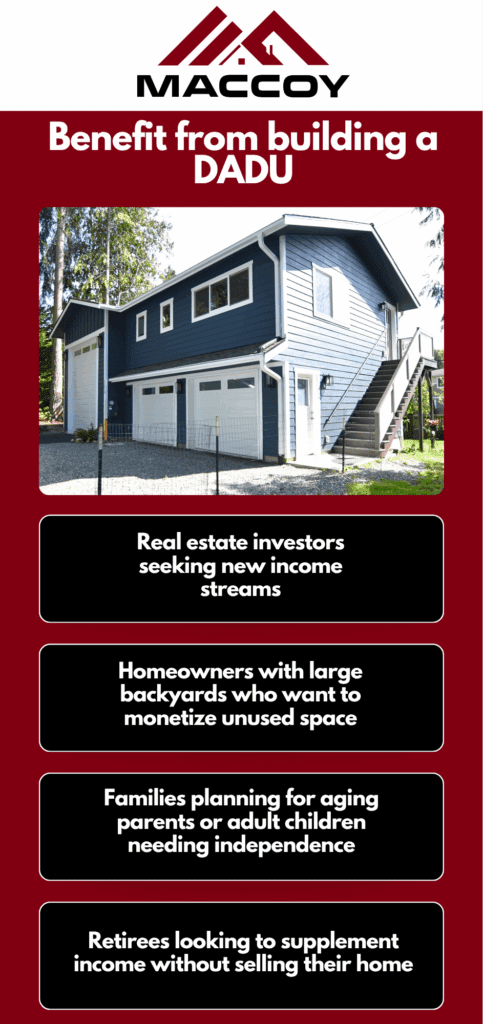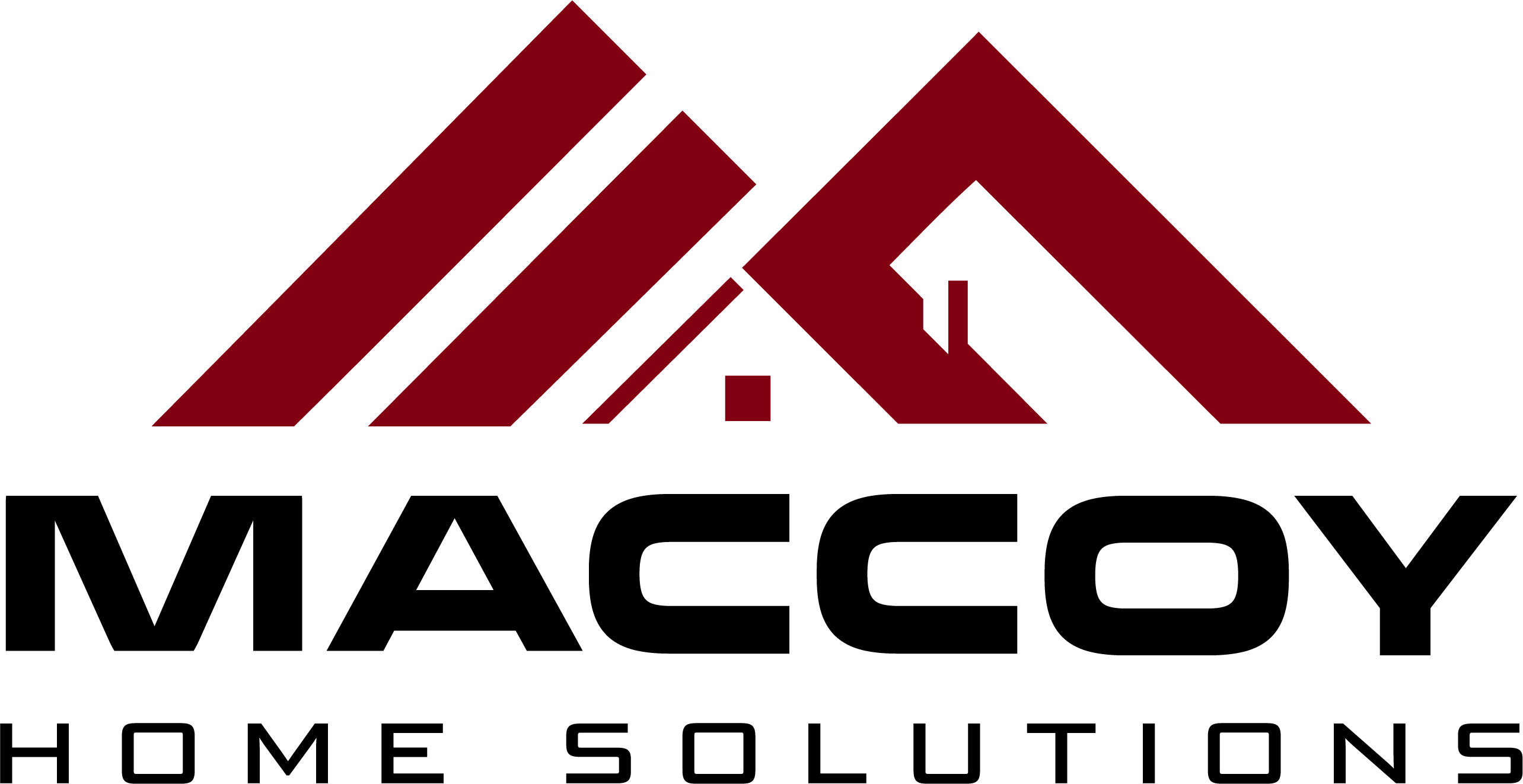
Accessory Dwelling Units (ADUs) and Detached Accessory Dwelling Units (DADUs) have become a practical solution for homeowners and real estate investors looking to create long-term financial value. Whether you are exploring ways to diversify your income or maximize underused property in Lynnwood, building a backyard cottage could open the door to consistent passive rental income.
This guide explains how a DADU can support your income goals, the local benefits for Lynnwood property owners, and how to take the next step with a free estimation from MacCoy Home Solutions.
What Is a DADU and Who Benefits from Building One?
A DADU is a stand-alone residential structure on the same lot as a primary home. Sometimes called a backyard cottage or carriage house, a DADU can be used as a long-term rental, guest suite, or multi-generational housing.
People who benefit from building a DADU include:
- Real estate investors seeking new income streams
- Homeowners with large backyards who want to monetize unused space
- Families planning for aging parents or adult children needing independence
- Retirees looking to supplement income without selling their home
In Lynnwood and the surrounding areas, local zoning has made it more accessible than ever to add a detached rental unit. A DADU might be your ideal next investment if you want to create passive rental income.
How DADUs Generate Reliable Rental Income
Adding a DADU allows you to generate monthly income by renting out the unit while maintaining your primary residence. Unlike more volatile investments, a well-located rental in a high-demand area like Lynnwood offers stable, long-term cash flow.
Here’s how DADUs deliver passive income:
- Monthly Rent: A typical DADU in Snohomish County can generate $1,500–$2,200 per month, depending on size, finishes, and location.
- High Demand in Lynnwood: With proximity to I-5, Sound Transit, and major employers, Lynnwood renters often seek affordable yet private housing options.
- Separate Utilities: Many DADUs can be metered separately, simplifying the tenant billing process.
- Privacy for Both Parties: A detached unit reduces noise and overlap between tenant and owner, increasing long-term tenancy satisfaction.
Many Lynnwood homeowners are exploring DADUs as a safer, more predictable alternative to investing in the stock market or short-term rentals, which can be seasonal and uncertain.

Local Tax and Legal Considerations (What to Know)
While the income potential is clear, navigating legal requirements is essential before proceeding with a DADU project. In Lynnwood, the city encourages ADU development, but there are guidelines to follow.
Key factors to be aware of:
- Zoning and Lot Size: Most single-family zones in Lynnwood allow DADUs, provided your lot meets minimum size and access standards.
- Owner-Occupancy Rules: Some jurisdictions may require the owner to live on the property.
- Permits: All construction projects, including site planning and utility connections, must go through the city’s permitting process.
- Financing: While no DADU-specific loans exist, some homeowners use HELOCs or cash-out refinancing to fund the build.
- Property Tax Impact: A new DADU may increase your property’s assessed value. Be sure to speak with a qualified tax advisor about the implications of your situation.
While MacCoy Home Solutions cannot offer tax or legal advice, we help clients navigate the permitting and zoning landscape so their projects start on solid ground. We’re happy to provide a free project estimation for Lynnwood homeowners to help them understand their options clearly.
Tips for Managing a DADU Rental Successfully
Earning passive income from a DADU requires more than just building the structure. Managing it well is key to maintaining occupancy and maximizing returns.
Property Management Tips:
- Screen Tenants Carefully: Your DADU is still on your property. Choose tenants who align with your lifestyle and expectations.
- Use a Lease Agreement: Formal rental terms help protect your property and income, even for friends or family.
- Consider a Property Manager: If you prefer a hands-off approach, hiring a manager can turn your DADU into passive income.
- Maintain the Unit Regularly: Like any home, a DADU requires upkeep to preserve its value and appeal to renters.
- Track Your Expenses and Income: Keeping detailed records helps you make informed decisions and prepare for tax season.
MacCoy Home Solutions provides clarity and structure, so you’re not left wondering what comes next once construction begins.
How MacCoy Home Solutions Simplifies Your DADU Investment
At MacCoy, we help homeowners and investors across Lynnwood explore the possibilities of ADUs and DADUs. We understand that building a second dwelling is a big decision—especially when your goal is passive income.
Here’s how we help:
- Site Review and Estimation: We’ll provide a free estimation based on your lot, goals, and city requirements.
- Zoning and Permit Support: Our team helps guide you through local regulations and coordinates with subcontractors when necessary.
- BuilderTrend Project Portal: Track your project in real-time with daily updates, photos, and messaging from one easy-to-use system.
- Customized Designs: Whether your vision is modern, rustic, or minimalist, our design team helps bring it to life.
- Strong Vendor Network: We work with trusted subcontractors specializing in excavation, framing, electrical, and more.
Our mission is to keep the process smooth, transparent, and personalized to your needs. Whether you’re a first-time investor or seasoned landlord, we’ll walk you through each step without overwhelming you.
Calculating ROI for Your DADU
Before investing in any property upgrade, you need to run the numbers. While we don’t offer financial advice, we can help you understand your potential ROI based on local rental data and typical build costs in Lynnwood.
Here’s a basic way to think about it:
- Estimate Monthly Rental Income
Example: $1,850/month - Estimate Annual Operating Costs
- Maintenance: $600/year
- Property management: $1,800/year
- Utilities (tenant-paid or included): Varies
- Maintenance: $600/year
- Estimate Build Cost
- Typically between $200,000–$350,000, depending on size, features, and lot conditions
- Typically between $200,000–$350,000, depending on size, features, and lot conditions
- ROI Formula (Yearly Net Income / Total Cost)
- Net income: $1,850 x 12 = $22,200
- Operating costs: $2,400
- Net: $19,800/year
- ROI: ~$19,800 / $275,000 = 7.2% ROI
- Net income: $1,850 x 12 = $22,200
This is a simplified example. For accurate projections, use our DADU Estimation tool or talk with a financial advisor.
Final Thoughts: Should You Build a DADU for Passive Income?
If you’re a Lynnwood homeowner looking to generate passive income, a DADU may be one of the most strategic investments you can make. It adds long-term property value and provides monthly revenue with relatively low risk. With Lynnwood’s growing rental market, the timing has never been better.
MacCoy Home Solutions is here to guide you through the process, from idea to completion—with clarity, transparency, and a focus on your goals.
FAQs: DADU Passive Income in Lynnwood
How long does it take to build a DADU in Lynnwood?
Timelines vary, but most DADUs take 6–9 months from planning to final inspection. Permitting and site-specific factors can affect this.
Can I rent my DADU to anyone, or are there restrictions?
Most Lynnwood DADUs can be rented to long-term tenants. Short-term rentals (e.g., Airbnb) may have restrictions depending on your zone. Always check with the city.
Do I need a separate address for my DADU?
In many cases, yes. Lynnwood often requires DADUs to have a distinct address for emergency services and mail. Your contractor or builder can help with this step during permitting.
